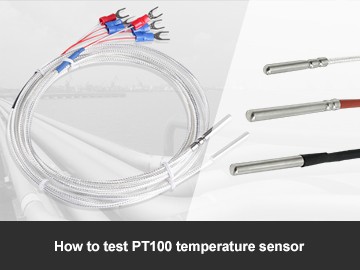How to test PT100 temperature sensor
PT100 temperature sensors are usually used in conjunction with display instruments, recording instruments, electronic calculations, etc. Directly measure the temperature of liquid, steam and gas medium and solid surface in the range of -200 ° C ~ 500 ° C in various production processes. To judge whether it is good or bad, just use a digital multimeter to measure it.
The characteristic of the PT100 temperature sensor is that the two output terminals (sometimes multi-terminal) are connected with a multimeter (although there is a certain resistance value). If the open circuit will be bad, it is undoubtedly the first step in the actual judgment. The resistance value of the thermal resistance is fixed. For example, the normal temperature of PT100 is around 110 ohms, and the normal temperature of CU50 is around 55 ohms. The output of the thermocouple is the voltage value. At a certain temperature, it will output a voltage signal of generally a few to tens of millivolts, which can be measured with the voltage file of a multimeter.
The output voltage of the thermocouple is only a few mV, depending on the accuracy of the multimeter. The digital multimeter can be used for rough measurement and judgment. The output of the thermocouple is in the order of millivolts. It is not possible to detect his output with a multimeter, but it can be measured for its continuity. In most cases, as long as the galvanic part (where the two wires are welded) is connected, there is no oxidation, no damage, and generally no problem. So at the same time, it can be taken out from the sheath for visual inspection. To really check, it is necessary to use a standard thermocouple to compare and measure the millivolt value it outputs.
The above is the detection method of whether the PT100 temperature sensor is a normal product. I hope to help everyone. If you have any questions, you can contact our technical staff.






